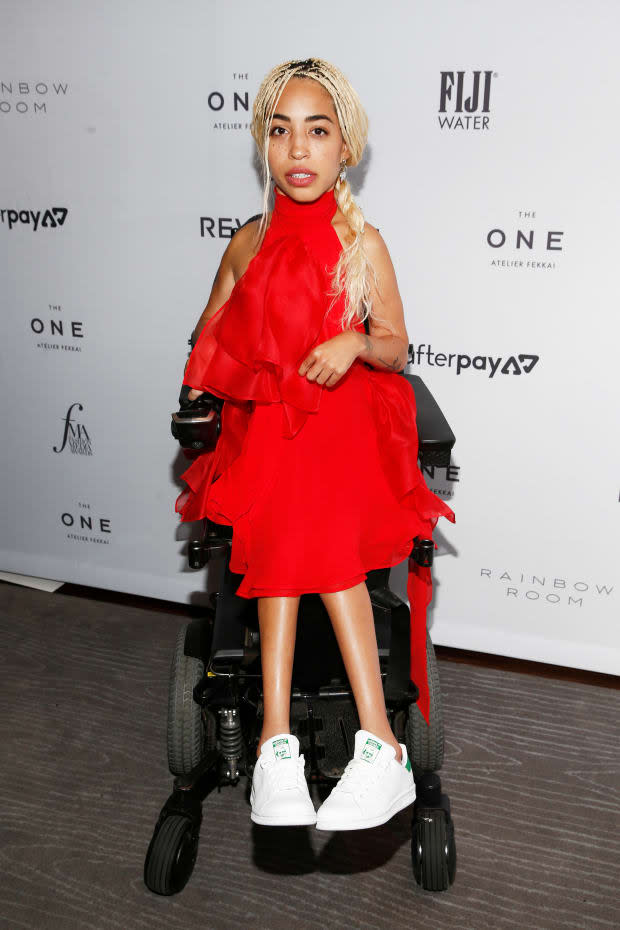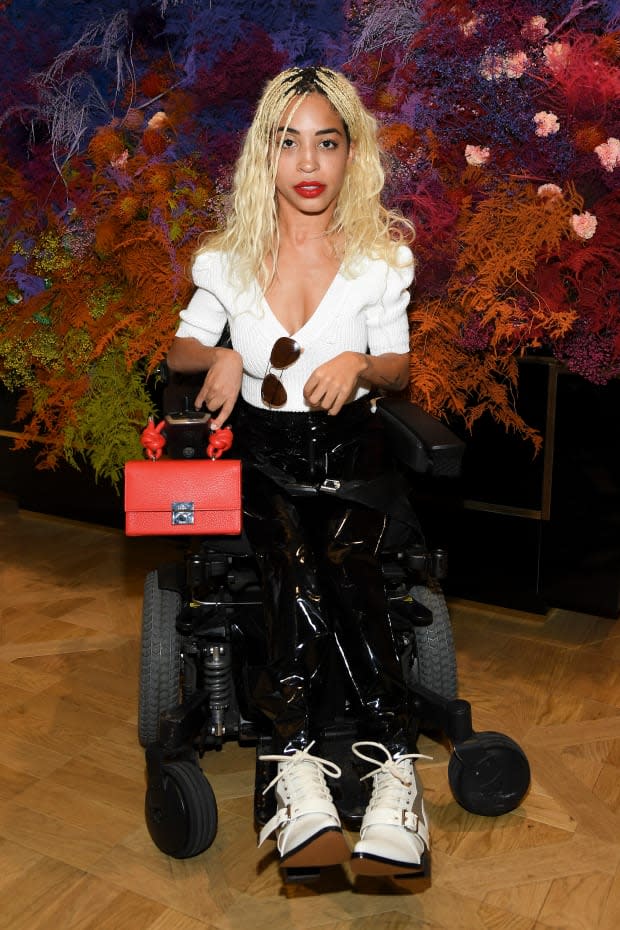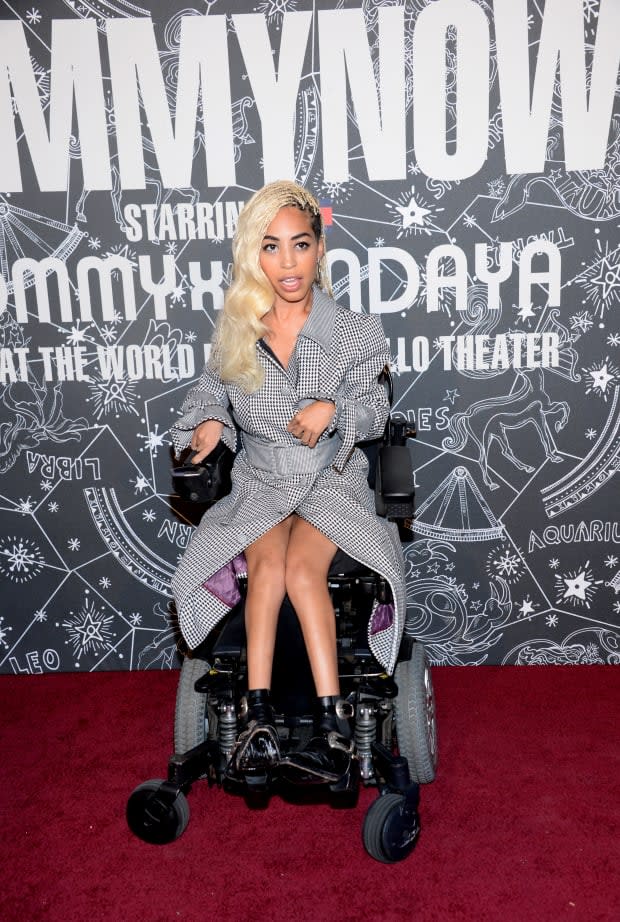How I Shop: Jillian Mercado
The model, actor and activist shares her earliest fashion memories, when she stopped letting her disability dictate her style and where she's been shopping lately.

Since she first started modeling six years ago, Jillian Mercado has graced the cover of Teen Vogue, starred in campaigns for brands like Target and Nordstrom and has become a thought-leader in the fashion industry. Through it all, she has used her platform to advocate for people with disabilities who historically haven't been represented or catered to in this space. And she's not limiting herself to just fashion: Mercado has crossed over to Hollywood with a role in "The L Word" reboot, "The L Word: Generation Q," which was just renewed for a second season.
"My character on [The L Word] has nothing to do with my disability. She just happens to have a disability. That's it," Mercado tells Fashionista, noting that people with disabilities are still rarely represented in television and film (and that more often than not, they're played by able-bodied actors.) She's taking what she's learned from working in fashion and using it to create the representation she didn't see growing up across different industries. By pursuing both career paths, she believes she can better serve her community and push boundaries even further.

Clothes have always played a part in Mercado's journey of self-discovery. (Her mother used to be a seamstress, and taught her how to sew.) They still do. The 32-year-old shared her earliest fashion memories, when she stopped letting her disability dictate her style and where she's been shopping lately.
Related Stories:
How I Shop: Peyton List
How I Shop: Serena Williams
How I Shop: Barbie Ferreira
"My mom was a seamstress when she was my age. She worked at a factory and was really into sewing and creating clothes. A lot of our childhood, my sisters and I had our own 'couture clothing' that was created by my mom. It was such a good bonding time.
"My mom loves to go shopping and we always went shopping together. I remember buying bigger sizes [when I was growing up]. If I was an extra small my mom would get me a medium because at the time I was wearing braces. We had to be creative and find something that was comfortable. But also when I was younger it was crucial to me to not show that I had braces. I was really insecure about them. I was always thinking, 'What kind of clothes do I really like wearing? And what would make me look less disabled?'
"I stopped wearing braces around age 14. I was just so tired of not feeling like myself [in order] to cater to the world and thinking that if I change who I am, then the world will accept me. In reality it should've been the other way around. I blame that on the representation that was around during that time — I never saw myself anywhere. If I did, it was in commercials about cancer or something really sad. I [realized] I'd rather be me and be happy than be miserable in my own self and body.

"In the '90s, there were zero accessible clothing brands — or anything that represented my community, for that matter. Back then, I loved jean jackets and putting pins on them. If you'd look at my photo albums [from] when I was little, that's all I wore. It was very Justin Timberlake and Britney [Spears].
"As I got older, I was always thinking, 'How do I become more independent?' My mom would always say this phrase in Spanish that means, 'I'm not going to be here forever.' It was kind of intense to hear [that] as a child, but it made me consider: If nobody is there to help me, how can I do things by myself? I would buy things thinking, 'Can I remove this and put this on myself?' I still go by that rule today.
"I've always liked going to stores physically and feeling the material, trying it on and seeing if it fits. Sometimes you're looking at something and when you're putting it on it's a completely different outfit. Some of these stores are messy — there are hangers on the floor and that's aggravating because my wheels would get stuck in them or the clothes would get tracks on them and it's just embarrassing at that point.
"In my early twenties, I spent time at Club Monaco, H&M, Zara and Urban Outfitters. I was really into the office look. I tried to make it as grungy as possible. I would wear a blouse from Club Monaco paired with a leather jacket and black skinny jeans. I tried doing a blazer but it just didn't work for me because it looked too corporate. I loved wearing skinny black jeans — I still do. When I was living with my family, I always had someone to help me. It's a process to put them on. It would take me more than 30 minutes. That was really aggravating because they were becoming harder to wear. I was interning, going to college and trying to have a social life. They were interfering [with my life].

"I realized no one was going to help me. No designer was going to figure out a creative way where we all can wear jeans. That was always frustrating. I think it was around that time I created a list of things that I love doing and make me happy — going to the ballet, to the movies or hanging out with my friends. One of them was working in fashion.
"I always enjoyed being creative in college. I interned at four or five places, and I would look at myself and think, 'I'd rather be in this environment than anything else I can even think of.' I wanted to shake things up in the industry because I didn't see anyone like myself becoming editors or photographers or anything behind the scenes. I wanted to get to a place where I could hire people like myself to be the people that I had been looking for. I knew they were out there in my heart and in my soul — they were just not given the opportunity to be in the limelight.
"I got my first Diesel campaign six years ago. I knew all along this was able to happen. Because I studied marketing in college, I knew that people love money and this was making money. And that if I really committed myself to that anything was possible.
"It's been awesome working with Tommy Hilfiger [on campaigns for its adaptive fashion line]. It introduced the idea that big brands can cater to people who have disabilities and it doesn't have to be dramatic. A lot of companies say it's a lot of money, but that's honestly an excuse — you just have to be creative about it. Have a team with people who actually have disabilities to help you do it. I'm thankful that they at least started the conversation.

"My mom taught me how to sew, which is awesome. I'm pretty good at hemming pants, which comes in handy. I've tried to cut down shopping fast fashion, which is obviously a privilege. I live in Los Angeles right now and there are so many vintage shops. I do a lot of vintage or secondhand shopping at places like Wasteland and Squaresville. I go down Santa Monica Boulevard and there are so many vintage shops.
"I don't wear skinny jeans anymore, even though I would love to. Mostly, I wear dresses or long skirts and crop tops. I still wear my leather jacket because I will never not wear that. It's one of my favorite pieces. I pretty much don't wear bigger sizes anymore unless it's a comfy sweater or something.
"As long as I'm alive, I'm always going to advocate for [people with disabilities]. Companies really need to understand that we're here and we're not going anywhere. They're losing a huge community of people and money. As soon as they realize that they'll understand. And when they get there, they need to hire us in positions of power because you can't do [it] if we're not there. We should have choices like everybody else has choices. There's a petite section and there's a plus size section but honestly, those sections should be one. It should all just be clothes.”
Want more Fashionista? Sign up for our daily newsletter and get us directly in your inbox.

 Yahoo News
Yahoo News 